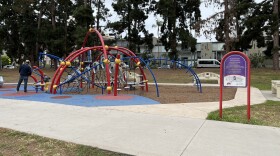Unlike almost every other country in the West, Norway remains relatively unscathed by the worst financial crisis in decades.
While most nations spent during boom years, Norway saved. Today, housing prices and consumption are rising, interest rates are low, and frugal management of income from Norway's huge oil and natural gas reserves have helped the country build one of the world's biggest investment funds.
'Plenty Of Money'
The sailing ship tattoos on Capt. Knut Jansen's forearms flex as he steers the boat Patricia through a narrow channel, past quaint vacation homes in the calm waters outside Kristiansand in southern Norway. He's smiling — and why shouldn't he be?
The tour boat business is good, the sun is shining and Johnny Cash is on the radio.
Jansen chuckles when asked how his nation has fared so well financially when most of the rest of the world has seen only economic pain and stress.
"Isn't it lucky that Norway has plenty of money? A big, big oil fortune," he says.
Save And Cap Spending
Unlike many energy-rich nations, Norway didn't go on a spending spree after gas and oil were found in the mid-1970s. Norway pumps much of its huge oil and gas revenue into a state investment fund. With a few exceptions, the government is only allowed to spend 4 percent of the fund a year.
"By the end of this year, I guess we are approaching $400 billion U.S.," says Amund Utne, a director general with Norway's Finance Ministry.
That's a $400 billion fund for a country of just over 4.5 million people. There is endless debate in Norway over how to use the fund. Some would like to see tax cuts or individual payments. But for now, the general consensus here is to continue to invest globally and grow the fund for the government to draw on in the future.
Boring Banks
But it wasn't just oil and gas revenue that saved Norway. The nation severely tightened banking oversight after a banking crisis in the early '90s. Since then, Norwegian banks have loaned more prudently. There was no housing bubble here. And during the frenzy of the past decade, the banks largely stayed away from exotic investments and financial products — what Utne calls the ruin of some U.S. and European banks.
"They got all the bright guys to make all kinds of fantastic products. Very creative. And it turned out it was maybe not the best solution in the end," he says. "I think Norwegian banks are not as creative."
He adds, "In this situation, it may be good to be somewhat boring."
The country's banks "were just a bit more careful," says economist Bjorn Erik Orskaug of DnB NOR, Norway's largest bank. He predicts relatively smooth sailing ahead for Norway.
"Housing prices are back up. Consumption is up. Banks are lending normally to the household sector and interest rates are staying low," Orskaug says.
But Kristin Holth, a vice president at DnB NOR, warns that banks here are not totally insulated from the global crisis and could feel more economic pain later this year and early next. Holth is not that worried, though.
"We feel we're in an extremely strong situation because 80 percent of our activity is based in Norway," she says. "And the Norwegian economy is solid — in oil and gas, in seafood, in shipping. And those markets are cyclical, yes, but we know they are cyclical, so we know how to handle the cyclicality of it."
But Is Oil Making Norwegians Soft?
Along a busy shopping district near Parliament in downtown Oslo, high-end shops, cafes and restaurants are full and busy. People are taking leisurely lunches; children are playing; and Knut Anton Mork, senior economist at Handelsbanken's Oslo office, seems a little disillusioned.
"There's no preparation being made for a non-oil economy," Anton Mork says.
He's concerned that oil revenue is making Norwegians complacent, self-centered and soft. Some are spending too much time in their cabins in the woods and their family boats on the sea, he worries, while others are too eager to abuse Norway's generous social safety net. Eleven percent of the working-age population in Norway is out on disability.
"It's not that the government is handing out money to everybody to live a lavish life," he says. "But it's become, with all the various programs, very easy to escape from working. I call this an oil-for-leisure program."
Anton Mork adds, "Sure, we've been lucky. But I don't think I'm being a crank. I think I'm saying we're living a lie. The lie is that we're taking care of everybody's needs. And we're not."
He says little is being done to deal with problems like Norway's aging population and decaying rail and road network. He says it's time for Norwegians to get out of the sauna and get back to work.
But his tough-love message will be a tough sell to a nation whose rich oil and gas fields are expected to be productive for another 50 years or more. For now, most Norwegians seem relaxed and even a little proud of themselves — that they survived the economic crisis in far better shape than any other country in Europe.
Copyright 2022 NPR. To see more, visit https://www.npr.org. 9(MDAzMjM2NDYzMDEyMzc1Njk5NjAxNzY3OQ001))







